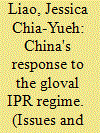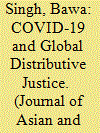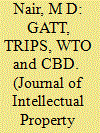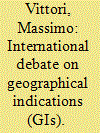|
|
|
Sort Order |
|
|
|
Items / Page
|
|
|
|
|
|
|
| Srl | Item |
| 1 |
ID:
023486


|
|
|
|
|
| Publication |
Jan 2003.
|
| Description |
139-154
|
|
|
|
|
|
|
|
|
|
|
|
|
|
|
|
| 2 |
ID:
095004


|
|
|
|
|
| Publication |
2010.
|
| Summary/Abstract |
The article uses the case of Basmati to identify a number of problems concerning geographical indications, including the interface with trademarks and the issue of genericity. Attempts to enter and free-ride on Basmati's premium rice market include the use of trademarks and (RiceTec's US) patent. Reviewing these, the article notes the subject matter of geographical indications can be implicated by other forms of intellectual property, such as patents. The case of Basmati is all the more problematic because of its transborder reality for which no provisions exist in the Agreement on the Trade-Related Aspect of Intellectual Property Rights (TRIPS). The article outlines and discusses various institutional models for a joint registration of Basmati between India and Pakistan as a possible solution for the TRIPS requirement of "home protection" (compare article 24.9).
|
|
|
|
|
|
|
|
|
|
|
|
|
|
|
|
| 3 |
ID:
099168


|
|
|
|
|
| Publication |
2010.
|
| Summary/Abstract |
One of the ground-breaking features of the World Trade Organization (WTO) Agreement on Trade-Related Aspects of Intellectual Property Rights (TRIPS) is its part III on the enforcement of intellectual property (IP) rights. In early 2009, the first WTO Dispute Settlement Panel Report primarily addressed obligations on IP enforcement. Here, the technical success of the US border measures claim comes with a crucial limitation: those Chinese measures that cover basically all of the commercially relevant activity are ab initio excluded from the panel's findings. Because they go beyond the minimum standards of TRIPS, the panel relied on one of the few TRIPS provisions that specify the relevance of TRIPS for additional "TRIPS-Plus" IP protection and enforcement. Given that such "TRIPS-Plus" measures are increasingly common in national laws and international treaties, it is time to take a closer look at how TRIPS addresses TRIPS-Plus IP protection. With a focus on border measures, I conclude that TRIPS contains not only minimum but also maximum standards or "ceilings" that impose limits on additional IP protection and enforcement. Such ceilings in TRIPS can function as limits for further extensions of IP protection and enforcement-as currently negotiated under a proposed Anti-Counterfeiting Trade Agreement or relating to border measures against generic drugs in transit.
|
|
|
|
|
|
|
|
|
|
|
|
|
|
|
|
| 4 |
ID:
076679


|
|
|
| 5 |
ID:
193198


|
|
|
|
|
| Summary/Abstract |
The second wave of the COVID-19 pandemic had left heart-wrenching impacts on all facets of life in general and the availability, accessibility, and affordability of medicines and vaccines in particular. Rather, the world has been divided into two groups regarding access to medicine and vaccines as haves and have-nots. The rich countries had pre-ordered the vaccines of COVID-19 along with the holding of the same. The pandemic situation was further worsened, given the Trade-Related Intellectual Property Rights (TRIPS) in practice and restrictions on sharing technology of vaccines, medicines, and life-saving equipment. In this context, India and South Africa have proposed the joint proposal and garnered support for waiving off TRIPS to ensure equity, accessibility, and affordability of vaccines and the same as public goods. In this review, we emphasize that global justice is one of the important elements of normative international theories, which focus on all the moral obligations from the world’s rich to the world’s poor. The paper also questions and argues that if the rich countries fail to go by the principles of global justice, can the Indian and South African (SA) patent diplomacy play a catalyst role in global justice? The review concludes with an emphasis on global solidarity, and the acceptance of joint India–South Africa’s “patent diplomacy” for TRIPS waiver would result in mass production and fair distribution, making the COVID-19 medicines and technologies available to everyone regardless of their poor–rich status.
|
|
|
|
|
|
|
|
|
|
|
|
|
|
|
|
| 6 |
ID:
095006


|
|
|
|
|
| Publication |
2010.
|
| Summary/Abstract |
In debates in the World Trade Organization over the protection of geographical indications (GIs), the European Union (EU) has framed its position in terms of the potential for GIs to protect local cultures, offer a quality guarantee to consumers, and provide opportunities for value-added agriculture. A key tenet of the EU's argument is that GI schemes can be successfully implemented in developing countries as well as Europe. However, my analysis of the case of tequila shows that GIs in developing countries face unique challenges. Tequila is the oldest GI outside of Europe, and is often cited as an example of a successful GI in a developing country. Despite obvious successes in terms of its market share, however, the GI for tequila has largely failed to benefit the local population and environment. My examination of the tequila case illustrates how, throughout the history of the evolving GI legislation for tequila, influential actors have manipulated production standards in ways that contradict the theoretical concept of a GI and negatively affect the overall quality of tequila. I situate this case within the larger framework of international legislation on GIs, arguing that higher standards and a more context-specific approach are necessary.
|
|
|
|
|
|
|
|
|
|
|
|
|
|
|
|
| 7 |
ID:
085863


|
|
|
|
|
| Publication |
2008.
|
| Summary/Abstract |
The Agreement on Trade-Related Aspects of Intellectual Property Rights is the most important as well as the most controversial instrument to date concerning intellectual property protection. What is not clear is the impact it will have on developing countries and whether it will actually meet its objective in the "… promotion of technological innovation and to the transfer and dissemination of technology …". The proponents of a strong patent regime vehemently argue that strengthening patent protection will lead to greater technology transfer in developing countries, and consequently inflow of foreign direct investment (FDI) as it is the most important channel for technology transfer. This article takes the Indian pharmaceutical industry as an example to examine the above assertion, and argues that simply enhancing patent protection may not necessarily result in a corresponding increase in FDI in the Indian pharmaceutical sector. It shows that in addition to strong patent protection, there are equally or even more important factors that have a bearing on the inflow of FDI.
|
|
|
|
|
|
|
|
|
|
|
|
|
|
|
|
| 8 |
ID:
110291


|
|
|
|
|
| Publication |
2011.
|
| Summary/Abstract |
India, being a signatory of WTO agreements, has moved from no or partial patent protection to full fledged patent protection. This represents a radical break from the past in which developing countries typically had only weak levels of patent protection. In this context, this research examines the steps involved in development of R&D capabilities in the Indian pharmaceutical firms as a response to strengthening of patent law. This paper analyses the post-TRIPS behaviour of domestic pharmaceutical firms in India with respect to R&D intensification, development of new molecules and enhanced DMF filings. The study establishes that firms in the post WTO era have increased their R&D efforts tremendously and are moving towards the development of advance level process and product R&D capabilities. Such firms have also opted for vigorous DMF filings abroad reflecting qualitative modifications and adjustments in its R&D capabilities in the production of exportables.
|
|
|
|
|
|
|
|
|
|
|
|
|
|
|
|
| 9 |
ID:
105134


|
|
|
|
|
| Publication |
2011.
|
| Summary/Abstract |
From the current perspective on 'IPR and Agriculture', there has to be a major discussion on global developments, negotiations and agreements on the role of intellectual property protection on the future of the agricultural sector, a vital segment for ensuring food security for the world population, particularly for developing countries where assuring food security is essential for their survival. Modern day intellectual property protection systems have their genesis in the General Agreement on Tariffs and Trade (GATT) which was initiated in 1946. Currently, the provisions under several agreements are being implemented by the Members of the World Trade Organization (WTO), the sole administrative body responsible for all aspects of implementation, monitoring and resolution of disputes between the member countries. Apart from the separate Agreement on Agriculture (AOA) which formed part of GATT, other agreements particularly Trade-Related Aspects of Intellectual Property Rights (TRIPS) also impinge heavily on the future of agriculture across the world. It is therefore prudent to evaluate the role that GATT, TRIPS, WTO, CBD and climate change play in the sustenance and development of agriculture pursuits, primarily in the developing and least developed economies.
|
|
|
|
|
|
|
|
|
|
|
|
|
|
|
|
| 10 |
ID:
023042


|
|
|
|
|
| Publication |
Nov 2002.
|
| Description |
865-897
|
|
|
|
|
|
|
|
|
|
|
|
|
|
|
|
| 11 |
ID:
106530


|
|
|
| 12 |
ID:
085861


|
|
|
|
|
| Publication |
2008.
|
| Summary/Abstract |
The Agreement on Trade-Related Aspects at Intellectual Property Rights contains several provisions that both allow for exclusion from patentability, as well as exceptions from the exercise of the rights of the patent holder. With the exception of the first part of article 30, none of these have until now been clarified by the World Trade Organization's (WTO's) dispute-settlement system. Based on an in-depth analysis of a number of these TRIPS provisions, the article identifies whether and how human rights provisions, as well as more overall human rights principles, can be applied in order to strengthen and confer legitimacy to these exclusion and exception provisions. While there is general agreement of the weight of human rights, there is more disagreement on the relevance of human rights, primarily due to the general wording of human rights provisions. Without undertaking a full analysis of the relevant human rights provisions, the article finds that human rights also do provide guidance in negotiations and enforcement of intellectual property rights. An analysis of the prospects for taking into account human rights within the dispute-settlement system and in the political bodies of the WTO is also conducted.
|
|
|
|
|
|
|
|
|
|
|
|
|
|
|
|
| 13 |
ID:
105125


|
|
|
|
|
| Publication |
2011.
|
| Summary/Abstract |
The Indian Protection of Plant Varieties and Farmers' Rights (PPV&FR) Act is now a decade old and PPV&FR implementation implications are now clearly visible. The shortcomings and inadequacies in implementation of the Act and the Rules are a matter of grave concern to the seed industry, in particular, and Indian agriculture, in general. This needs to be addressed and resolved by the Central Government and the PPV&FR Authority in order to meet the objectives enshrined in the Act. These inadequacies are perceived in terms of slow-moving approach for database maintenance of existing varieties, notification of crop species eligible for registration, duration and effect of registration of extant notified varieties and varieties of common knowledge, ambiguity in parent line and hybrid registration under new variety and/or extant variety category, powers of the Registrar, advertisements published in Plant Variety journals, registration of transgenic varieties, parent lines etc. This paper highlights the issues that need to be resolved to avoid misuse of the Act and thereby unwarranted litigations.
|
|
|
|
|
|
|
|
|
|
|
|
|
|
|
|
| 14 |
ID:
090213


|
|
|
|
|
| Publication |
2009.
|
| Summary/Abstract |
This paper analyses the Indian government's policy response to the Trade-related Intellectual Property Rights Agreement (trips) and examines the implications of this response for food security and farmers. trips has become one of the most controversial agreements of the wto. This is because of its wide and far-reaching mandate and its complex socioeconomic implications. It is argued that the changes made to the Indian Patents Act in response to trips will compromise the food sector and the rights of small farmers by conferring strong rights on upstream agents who produce proprietary agricultural inputs using biotechnology. Not only are these agents able to exert monopoly price control over agricultural inputs for 20 years, they also have the right to determine the conditions under which farmers and researchers use patented processes and products. The paper outlines policy options available to the Indian government to tighten the scope of patentability in the food sector.
|
|
|
|
|
|
|
|
|
|
|
|
|
|
|
|
| 15 |
ID:
021899


|
|
|
|
|
| Publication |
May 2002.
|
| Description |
315-371
|
|
|
|
|
|
|
|
|
|
|
|
|
|
|
|
| 16 |
ID:
089876


|
|
|
| 17 |
ID:
121773


|
|
|
|
|
| Publication |
2013.
|
| Summary/Abstract |
Where hiv/aids is concerned, the twin goals of 'zero new infections' and an 'aids-free generation' are now, due to advances in treatment (and treatment as prevention), a realistic possibility. However, these goals can only be achieved through the scaling-up of treatment to the point of universal access. It is inevitable that the success of any scaling-up will be predicated on cost, particularly of hiv/aids medicines. This article argues that recent changes in the global intellectual property landscape-effected by way of bilaterally- and plurilaterally-negotiated trade agreements initiated by developed countries-jeopardise the target of universal access. Enhanced protection of international intellectual property rights increasingly poses a threat to the development of, and international trade in, generic medicines. Unless developing countries move to reinvigorate moribund multilateral institutions, particularly the wto, they will lose control of the intellectual property agenda, and thus the ability to impose an alternative vision regarding universal access.
|
|
|
|
|
|
|
|
|
|
|
|
|
|
|
|
| 18 |
ID:
095009


|
|
|
|
|
| Publication |
2010.
|
| Summary/Abstract |
Geographical indications (GIs) have progressively become a global phenomenon. The Agreement on Trade-Related Aspects of Intellectual Property has recognized GIs as a major category of intellectual property. Some 76 countries protect GIs today through specific legal systems (commonly referred to as sui generis), which provide for the registration of geographical names as a separate kind of intellectual property right. However, from the point of view of producers, several issues remain to be clarified in the international debate over GIs. First of all, the international rules do not provide the interested parties with effective legal remedies to stop infringements. As a result, unlawful uses of protected names have been increasing over the years. Monitoring GIs and reaching out to relevant enforcement authorities to denounce any eventual abuse are becoming complex and expensive tasks. Finally, in several countries, in spite of a tremendous potential, producers and policy-makers have not yet fully grasped the role of GI in terms of sustainable development. In light of the above, the purpose of this article is to provide an overview of the major issues characterizing the international debate over GIs and present the strategy adopted by the global coalition of GI producers-oriGIn-to address those problems.
|
|
|
|
|
|
|
|
|
|
|
|
|
|
|
|
| 19 |
ID:
068820


|
|
|
| 20 |
ID:
023487


|
|
|
|
|
| Publication |
Jan 2003.
|
| Description |
155-189
|
|
|
|
|
|
|
|
|
|
|
|
|
|
|
|
|
|
|
|
|